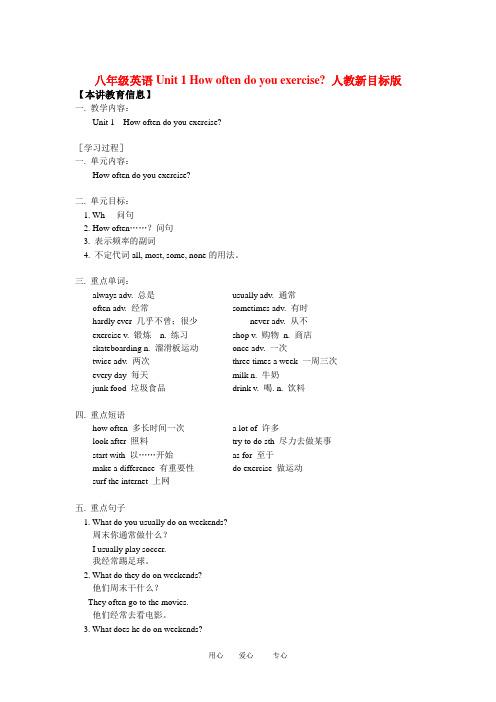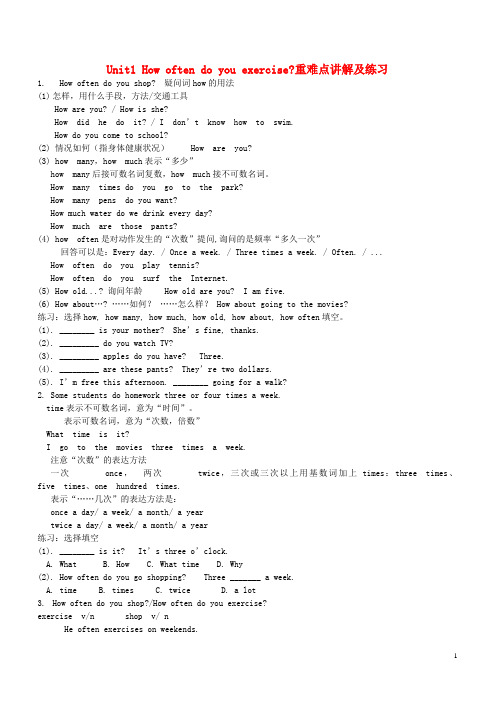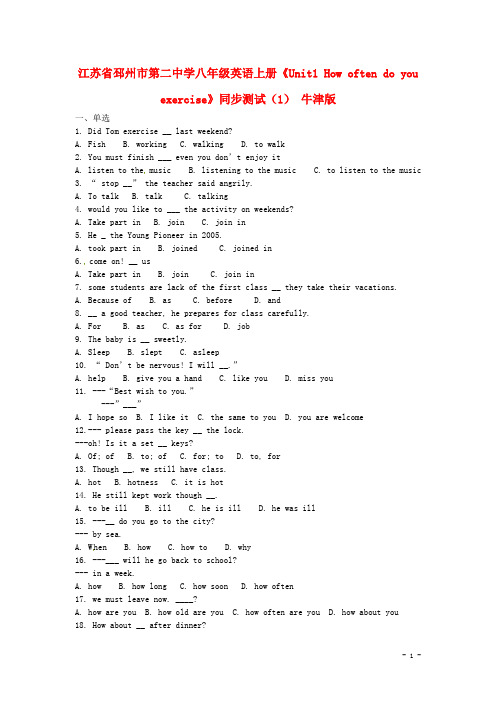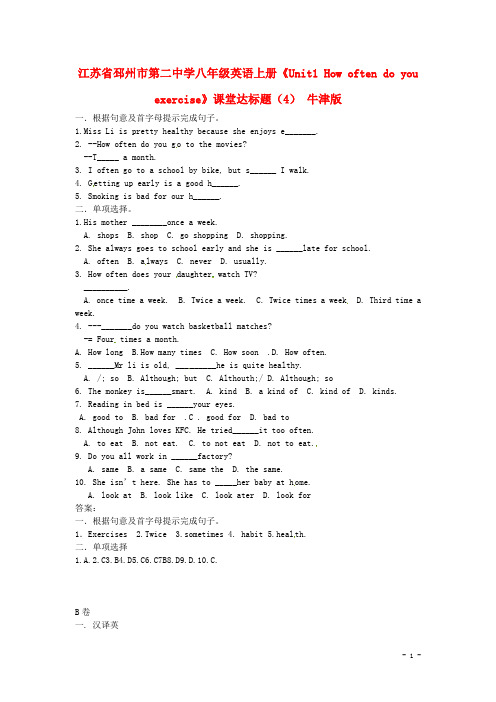山东省临沭县2012年秋八年级英语上册《Unit 1 How often do you exercise》教案2 人教新目标版
- 格式:doc
- 大小:68.00 KB
- 文档页数:9

八年级英语Unit 1 How often do you exercise? 人教新目标版【本讲教育信息】一. 教学内容:Unit 1 How often do you exercise?[学习过程]一. 单元内容:How often do you exercise?二. 单元目标:1. Wh- 问句2. How often……?问句3. 表示频率的副词4. 不定代词all, most, some, none的用法。
三. 重点单词:always adv. 总是usually adv. 通常often adv. 经常sometimes adv. 有时hardly ever 几乎不曾;很少never adv. 从不exercise v. 锻炼n. 练习shop v. 购物n. 商店skateboarding n. 溜滑板运动once adv. 一次twice adv. 两次three times a week 一周三次every day 每天milk n. 牛奶junk food 垃圾食品drink v. 喝. n. 饮料四. 重点短语how often 多长时间一次 a lot of 许多look after 照料try to do sth 尽力去做某事start with 以……开始as for 至于make a difference 有重要性do exercise 做运动surf the internet 上网五. 重点句子1. What do you usually do on weekends?周末你通常做什么?I usually play soccer.我经常踢足球。
2. What do they do on weekends?他们周末干什么?They often go to the movies.他们经常去看电影。
3. What does he do on weekends?他周末干什么?He sometimes watches TV.他有时候看电视。

![八年级英语上册《Unit1_How_often_do_you_exercise?》SectionA课件_人教新目标版[1]](https://img.taocdn.com/s1/m/04dddd680b1c59eef8c7b4fe.png)

Unit1 How often do you exercise?重难点讲解及练习1. How often do you shop? 疑问词how的用法(1)怎样,用什么手段,方法/交通工具How are you? / How is she?How did he do it? / I don’t know how to swim.How do you come to school?(2) 情况如何(指身体健康状况) How are you?(3) how many,how much表示“多少”how many后接可数名词复数,how much接不可数名词。
How many times do you go to the park?How many pens do you want?How much water do we drink every day?How much are those pants?(4) how often是对动作发生的“次数”提问,询问的是频率“多久一次”回答可以是:Every day. / Once a week. / Three times a week. / Often. / ...How often do you play tennis?How often do you surf the Internet.(5) How old...? 询问年龄 How old are you? I am five.(6) How about…? ……如何?……怎么样? How about going to the movies?练习:选择how, how many, how much, how old, how about, how often填空。
(1). ________ is your mother? She’s fine, thanks.(2). _________ do you watch TV?(3). _________ apples do you have? Three.(4). _________ are these pants? They’re two dollars.(5). I’m free this afternoon. ________ going for a walk?2. Some students do homework three or four times a week.time表示不可数名词,意为“时间”。

江苏省邳州市第二中学八年级英语上册《Unit1 How often do you exercise》同步测试(1)牛津版一、单选1. Did Tom exercise __ last weekend?A. FishB. workingC. walkingD. to walk2. You must finish ___ even you don’t enjoy itA. listen to the musicB. listening to the musicC. to listen to the music3. “ stop __” the teacher said angrily.A. To talkB. talkC. talking4. would you like to ___ the activity on weekends?A. Take part inB. joinC. join in5. He _ the Young Pioneer in 2005.A. took part inB. joinedC. joined in6. come on! __ usA. Take part inB. joinC. join in7. some students are lack of the first class __ they take their vacations.A. Because ofB. asC. beforeD. and8. __ a good teacher, he prepares for class carefully.A. ForB. asC. as forD. job9. The baby is __ sweetly.A. SleepB. sleptC. asleep10. “ Don’t be nervous! I will __.”A. helpB. give you a handC. like youD. miss you11. ---“Best wish to you.”---”___”A. I hope soB. I like itC. the same to youD. you are welcome12.--- please pass the key __ the lock.---oh! Is it a set __ keys?A. Of; ofB. to; ofC. for; toD. to, for13. Though __, we still have class.A. hotB. hotnessC. it is hot14. He still kept work though __.A. to be illB. illC. he is illD. he was ill15. ---__ do you go to the city?--- by sea.A. W henB. howC. how toD. why16. ---___ will he go back to school?--- in a week.A. howB. how longC. how soonD. how often17. we must leave now. ____?A. how are youB. how old are youC. how often are youD. how about you18. How about __ after dinner?A. Exercising walkingB. to exercise walkC. to exercising walking19. I don’t know ___.A. how to do thatB. how do thatC. how do you do that20. I __ have a nap after n oon.A. Some timesB. sometimesC. some timeD. sometime21. Tom will visit his parents __ next week.A. some timesB. sometimesC. some timeD. sometime22.The hot day will keep for ___.A. some timesB. sometimesC. some timeD. sometime23. Though I go to the beach __, I still want to go again.A. some timesB. sometimesC. some timeD. sometime24. John is so lazy, he __ exercises.A. hardB. a hardC. hardsD. hardly25. we must work __.A. hardB. a hardC. hardsD. hardly26. it is a dog, __?A. doesn’t itB. is itC. isn’t it27. He doesn’t watch the game,___?A. doesn’t itB. is itC. doesn’t the gameD. does he28. He hardly has __ ice cream in summer.A. someB. anyC. manyD. a few29. There __ a lot of food on the table.A. isB. areC. be30. would you like to have __ tea?A. someB. anyC. muc hD. a little31. Today is __ cool.多A. a lot ofB. a lotC. someD. rather32. You waste浪费___ time.A. much tooB. too muchC. too manyD. many too33. Would you like to have __ tea?多A. someB. some ofC. another ofD. another cup of34.--- ___ do you work in the company?---3 yearsA. How longB. HowC. How soonD. How often35. -- __ will he visit his friend?-- in a month?A. How longB. HowC. How soonD. How often36. ---___ is from Kaifeng to Zhengzhou?--about 70 KMA. How longB. how farC. How soonD. How often37. ---___ did you eat junk food?--- neverA. How longB. how farC. HowD. How often38. Though Tom just left school, __ he went to studying at home.A. 不填B. yetC. butD. and39. __ of them is lost.A. NotB. noC. neverD. none二、完形填空Student's life in AmericaFrom Monday to Friday students usually get up at seven. Then they wash their faces and have breakfast. They usually have eggs, bacon(熏肉),bread, fruit and a glass of milk. After breakfast they go to school on foot or by yellow school 1 .Some students ride bikes. They get to school at about half past eight. Then they put their 2 in their lockers(柜子)and take only one book, a notebook and a pencil to each class. In middle school students have 3 for six hours. Their classes are English, writing, math, 4 and so on.At noon students have lunch at school. They usually 5 meat, fruit, vegetables, bread and a drink. 6 most students like pizza, hot dogs and hamburgers better. Students don't have a short 7 .They go back to have classes 8 lunch until three o'clock. Then they g o home.Students usually play or watch TV before 9 .They have supper at six in the evening. The supper usually has soup, meat, 10 , rice or pasts(面食).After supper they do their homework. Sometimes they play or talk with their parents.( )1.A.car B. bike C. bus D. plan( )2.A.school bags B. clothes C. pencil-boxes D. money( )3.A.meals B. a rest C. each class D. classes( )4. A. music, playing football B. Chinese, runningC. music, art(艺术)D. P.E, listening to music( )5.A.buy B. have C. eat D. bring( )6.A.So B. And C. Because D. But( )7.A.sleep B. talk C. drink D. holiday( )8.A.at B. before C. after D. in( )9.A.a supper B. supper C. the dinner D. a dinner( )10.A.vegetables B. dumplings C. fishes D. potatoes三、阅读理解(A)判断正误,正确的写“T”,错误的写“F”A good breakfast is important. You can easily understand it. By breakfast time you have not eaten anything about twelve hours. Your body needs food for morning activities(活动). One good breakfast should be rice or bread, an egg , milk and fruit. On a cold morning a cup of hot drinks is necessary(必需的). A good breakfast helps you to smile more easily. It helps you to be more friendly and also to work better and play more happily. Your whole day will be more fun after you have enjoyed a good breakfast.( )1.It's not very impor tant to have a good breakfast.( )2.Food is needed in the morning because you have had nothing to eat for the whole night.( )3.Only rice or bread will be a good breakfast.( )4.If you get up late, you will not eat your breakfast.( )5.A good breakfast is helpful to you.(B)Fish and chips, and Chinese take-away food(熟食) are very popular in England. But they are less popular(不受欢迎) in the USA. In the USA, they eat take-away food, too, like fried(油炸的) chicken. But the most popular kind of take-away food is hamburger. It looks like bread with meat in it. Hamburgers are delicious. They are very popular in the world.Chinese food has different tastes and is usually very delicious. It's also very popular in the world.( )1.What's the favourite food in the USA?A. Hamburger.B. Fish and chips.C. Fried chicken.D. Take-away food. ( )2.What does hamburger look like?A. It looks like a mooncake.B. It looks like a s ausages(香肠).C. It looks like bread with meat in it.D. It looks like a banana. ( )3.Which food has different tastes and is usually very delicious?A. Engli sh food.B. American food.C. Chinese food.D. French food. ( )4.Are fish and chips and Chinese take-away food very popular in the USA?A. Yes, they are.B. No, they aren't.C. Yes, they were.D. No, they weren't.( )5.Who do you think likes hamburgers best?A. The old people.B. Children.C. Most of the people.D. Nobody四、写作Tom通常6:30在家吃早饭。

江苏省邳州市第二中学八年级英语上册《Unit1 How often do you exercise》课堂达标题(4)牛津版一.根据句意及首字母提示完成句子。
1.Miss Li is pretty healthy because she enjoys e_______.2. --How often do you g o to the movies?--T_____ a month.3. I often go to a school by bike, but s______ I walk.4. G etting up early is a good h______.5. Smoking is bad for our h______.二.单项选择。
1.His mother ________once a week.A. shopsB. shopC. go shoppingD. shopping.2. She always goes to school early and she is ______late for school.A. oftenB. a lwaysC. neverD. usually.3. How often does your daughter watch TV?__________.A. once time a week.B. Twice a week.C. Twice times a weekD. Third time a week.4. ---_______do you watch basketball matches?-= Four times a month.A. How longB.How many timesC. How soon .D. How often.5. ______Mr li is old, _________he is quite healthy.A. /; soB. Although; butC. Althouth;/D. Although; so6. The monkey is______smart. A. kind B. a kind of C. kind of D. kinds.7. Reading in bed is ______your eyes.A. good toB. bad for .C . good for D. bad to8. Although John loves KFC. He tried______it too often.A. to eatB. not eat.C. to not eatD. not to eat.9. Do you all work in ______factory?A. sameB. a sameC. same theD. the same.10. She isn’t here. She has to _____her baby at h ome.A. look atB. look likeC. look aterD. look for答案:一.根据句意及首字母提示完成句子。
八年级上册Unit 1 How often do you exercis八年级上册Unit 1 How often do you exercise?教学设计Ⅰ.Analyis of teaching material1.The topic of this unit is about free time actmties。
Suchtopicisrelated to students’daily life. So it is helpful toraise learning interest of students. If students can learn this unit well,it will behelpful to make students learn the the rest of this book.2 .Teaching Aims and Demands(1) Knowledge Obj ectIn this unit students learn to talk about howoften they do things.(2)Ability ObjectsTo improve students’ability of listening,speaking,reading and writing.(3)Moral ObjectsTo help students form a good eating habit.To do exercise every day and keep fit.3 .Teaching Key PointTo master the key vocabularyand the target language presented in this unit.4 .Teaching Difficult PointTo train students how to use the key vocabulary and the target language by reading and writing.5 .Studying WaysTeach students how to use context.Teach students how to do a survey.Ⅱ.Language FunctionTalk about how often you do things.Ⅲ.Target LanguageWhat do you usually do on weekends?I sometimes go to the beach..How often do you eat vegetables?Every day.Most of the students do homework every day.Ⅳ.StructureWh-questionsWhat do…?How often…?Adverbs of frequencyAll/most/some/noneV .Vocabularyalways,usually,often,sometimesputer games on weekends.I never play cards on weekends.What does your English teacher do on weekends?(Help students to say)Students: Our English teacher always reads English books on weekends. She usually exercises onweekends…..Teacher: I exercise every day. I go shopping once a week. I watch TV twice a week. I go dancing three times a month…How often does your English teacher exercise/ go shopping / watch TV / go dancing?Students: Our English teacher exercises every day….Step 6: Listening (2a and 2b)Teacher: My friend Cheng is talking about something about his different activities, let’slisten and number the activities you hear.Teacher: Listen again. How often does Cheng do the activities above?(Help students to finish 2a and 2b)Step 7:.Do a survey:Activities How oftenTake a showerWash your hairExerciseClean your roomAsk and answer: How often do you take a shower?How often does he / she take a shower?Let Ss ask and answer in pairs, using always, usually, often, sometimes, hardly ever or never.Step 8:Homework1. Do exercises on pages 1-2 of the workbook topractice the language presented in this unit.2. Remember what we learn today.3. Write a passage about what you often do on weekends and how often you do different activities.s();【八年级上册Unit 1 How often do you exercise?教学设计】。
八年级上册Unit1Howoftendoyouexercis八年级上册Unit 1 How often do you exercise?教学设计Ⅰ.Analyis of teaching material1.The topic of this unit is about free time actmties。
Suchtopicisrelated to students’daily life. So it is helpful toraise learning interest of students. If students can learn this unit well,it will be helpful to make students learn the the rest of this book.2 .Teaching Aims and Demands(1) Knowledge Obj ectIn this unit students learn to talk about how often they do things.(2)Ability ObjectsTo improve students’ability of listening,speaking,reading and writing.(3)Moral ObjectsTo help students form a good eating habit.To do exercise every day and keep fit.3 .Teaching Key PointTo master the key vocabularyand the target language presented in this unit.4 .Teaching Difficult PointTo train students how to use the key vocabulary and the target language by reading and writing.5 .Studying WaysTeach students how to use context.Teach students how to do a survey.Ⅱ.Language FunctionTalk about how often you do things.Ⅲ.Target LanguageWhat do you usually do on weekends?I sometimes go to the beach..How often do you eat vegetables?Every day.Most of the students do homework every day.Ⅳ.StructureWh-questionsWhat do…?How often…?Adverbs of frequencyAll/most/some/noneV .Vocabularyalways,usually,often,sometimeshardly,ever,never, exercising,shopping,skateboarding once,twice,three times a week,month, every day, milk,junk,food, drinkⅥ.Recyclingreading,watching TV,go to the movies, fruit,vegetables Ⅶ.Learning strategiesUsing context.Transforming information.Ⅷ.Teaching timesSix periodsPeriod OneTeaching Aims:1. Learn to talk about how often do you do things2. To learn the words of the adverbs of frequency.Teaching Difficulties:1.words: exercise, skateboard, hardly, ever, shop, once, twice, time, surf, internet, program.2.phrases:how often, on weekends, go to the movies,exercise, go skateboarding, always , usually , often , never , hardly ever , sometimes .3.Sentence patterns: What does she /he do on weekends ? She often goes to the movies .How often do you shop ? Once a week / Twice a week .Teaching Aids: Tape recorder;Multi-Media.Teaching Procedures:Step 1 :Greeting.1. Teacher: Summer vacation is over. I think you had a wonderful vacation, am I right? Did you enjoy your summer vacation? Could you please tell us what you did in your summer vacation?2. Encourage students to share their holidays with the whole class.Step 2 :Leading – inTeacher: Oh, you had a happy and colorful vacation. Today we will talk about more activities on weekends. First, let’s think about what we can do on weekends. (Ask some questions and let students think it over).Teacher: I often sing on weekends, what do you usually do on weekends?S1: I often take piano lessons.Teacher: What does she usually do on weekends? (Ask another student)S2: She often takes piano lessons.Teacher: What about you? (Ask S2)S2: I often play basketballTeacher: What does he usually do on weekends? (Ask another student)S3: He often plays basketball.(Ask more students in the same way)Step 3:1a Look at the screen. Make a list of the different weekend activities.First let students list different activities, thenTeacher: Now work in pairs, ask and answer---What does he/she do on weekends?--- She goes shopping. / She reads books. / He exercises. / He watches TV. / She goes skateboarding.Step 4:1b Listen and write the letters from the picture above on the lines below.Get students to focus on the six adverbs in activity 1b and help students to understand:Always-100% usually- 90% often-80% sometimes-50% hardly ever-10% never-0%Step 5:Lead-in:Teacher: I always read English books on weekends.I usually exercise on weekends.I often go to visit my grandparents.I sometimes go shopping on weekends.I hardly ever play computer games on weekends.I never play cards on weekends.What does your English teacher do on weekends?(Help students to say)Students: Our English teacher always reads English books on weekends. She usually exercises on weekends…..Teacher: I exercise every day. I go shopping once a week. I watch TV twice a week. I go dancing three times a month…How often does your English teacher exercise/ go shopping / watch TV / go dancing?Students: Our English teacher exercises every day….Step 6: Listening (2a and 2b)Teacher: My friend Cheng is talking about something about his different activities, let’s listen and number the activities you hear.Teacher: Listen again. How often does Cheng do the activities above?(Help students to finish 2a and 2b)Step 7:.Do a survey:Activities How oftenTake a showerWash your hairExerciseClean your roomAsk and answer: How often do you take a shower?How often does he / she take a shower?Let Ss ask and answer in pairs, using always, usually, often, sometimes, hardly ever or never.Step 8:Homework1. Do exercises on pages 1-2 of the workbook to practice the language presented in this unit.2. Remember what we learn today.3. Write a passage about what you often do on weekends and how often you do different activities.。
八年级英语上册(Go for it !)Unit 1 How often do you do exercise 序号:主备人:时间:执教人:Teaching Aims:1. Learn to talk about how often do you do things2. To learn the words of the adverbs of frequency.Teaching Difficulties:1.words:exercise, skateboard, hardly, ever, shop, once, twice, time, surf, Internet,program.2.phrases: how often, on weekends, go to the movies, exercise, go skateboarding,always , usually , often , never , hardly ever , sometimes .3.Sentence patterns: What does she /he do on weekends ? She often goes to themovies .How often do you shop ? Once a week / Twice a week ··· . Teaching Aids: Tape recorder; Multi-Media.Teaching Procedures:课时分配:Period 1: Section A(1a---Grammar)Period 2:Section A 3a--- 4Period 3 SectionB 1a--2cPeriod 4 SectionB 3a---4教学过程Period OneStep 1 :Greeting.1.Welcome back: Talk about their holidays.2.Encourage Ss to share their holidays with the whole class.Step 2 :Leading – in(运用多媒体投放教师本人业余爱好,引出频率词及句型。
)1. Do you like watching TV? Yes ,I do.Do you watch TV every day? Yes, I do.How often do you watch TV?I watch TV every day. I watch TV twice a week.2.Introduce the key vocabulary.Ask the students to say what they see in the thought bubbles.Check the answers on the board.2.3. Name each activity.Repeat reading the following: watch TV, read, shop, go skateboarding, exercise, draw 4. Look at each picture in 1c.Tell what the person does on weekends. (投放picture1.)Check the Ss orally.1) Make sure what they will hear and do .2) Read these adverbs and explain.5.Play the tape twice .Write the letters on the line.Ask Ss: Well, do you still remember your last vacation?How did you spend it?Was it the same as this summer vacation?So what do you often do in your summer vacation?Then show some phrases for Ss to practice.Then present as following:always>usually>often>sometimes>hardly ever(几乎没有) >neverand let them understand their differences at the first time.Step 3 :Guessing Presentation and Practice.always, usually, often, sometimes, hardly ever(几乎没有) or never.And during this part, present surf the net exercise and go skateboarding. Step4 :.Do a survey:Ask and answer: How often do you take a shower?How often does he take a shower?Let Ss ask and answer in pairs, using always, usually, often, sometimes, hardly ever(几乎没有) or never.Step 5: Homework1.Do exercises on pages 1-2 of the workbook to practice the language presented in this unit.2.Remember what we learn today.运用多媒体进行总结归纳。
教后反思:Period TwoTeaching Aims:1. Students can learn to talk about activities and how often to each other2. Students can listen, talk ,read and write these words correctlyTeaching Difficulties:1. Words: high school, most, no, result, active, for as, for about2. Phrases: for as, for about3.Sentence patterns: How often do you shop? I shop once a month.How often does Cheng watch TV? He watches TV..Teaching Aids: Tape recorder; Multi-Media.Teaching Procedures:Step One :Greeting.Step Two :Leading – in(运用多媒体展示周末学生活动调查结果,进行对话训练)Drills:T: What do you usually do on weekends ?S1: I usually play soccer .T: How often do you play soccer ?S1: I play soccer twice a week .T: How often does he play soccer ?The other Ss: He plays soccer twice a week .Repeat for three times .Step Three :Pre-task(投放grammar box)Review the grammar box .Step Four :While-task1. Call attention to the survey .2.Make sure the Ss understand the chart .T: What activity do ninety-five percent of Green High students do every day ?3. Ss answer .If necessary , give them help .4. Review the information in the green box with Ss .5. Read the article first by the Ss .6. Check the answers .7. Practise reading .Step Five :Post-task1.T: What can you do to improve your English ?(e.g. read English books, practice reading and speaking ) How often do you ··· ?2.Think of more things you can do to improve your English and write them here .3.Ask several Ss each question .4.See: Who is the best English students in the classStep Six: Homework:1.Revise the new words .2. Preview the next section教后反思:Period ThreeTeaching Aims:Learn to talk about how often they do things to keep healthy.Teaching Difficulties:1.Words:(运用多媒体投放视频图片,让学生感知食物名称)junk food, milk, coffee, chips, cola, chocolate, drink, health, how many, interviewer.2.Phrases: how many, be good for, be bad for, every day.3.Sentence patterns: How often do you drink milk, Liu Feng?How many hours do you sleep every night?She says it’s good for my health.Teaching Aids: Tape recorder; Multi-Media.Teaching Procedures:Step 1 :Greeting.Step 2 :Warm-up1.Enjoy an English song.2.Free talk. Talk with Ss about the following questions:Do you like fruit vegetables?Yes, I do.I love it/ them. It’s/They’re delicious. And it’s /they’re healthy food. It’s/They’re good for our health. Or No, I don’t. It’s awful. I can’t stand it.Ask Ss: How often do you eat fruit vegetables?Step 3: Presentation1.Teach milk. Do you like milk? Do you drink milk every day? Why /Why not?2.Then teach chip /cola/chocolate/coffee in the same way. Don’t forget to ask them Are they/Is it healthy food /drink? They’re /It’s healthy/unhealthy/ junk food. Don’t eat /drink them /it too often.Step 4: Pair work(多媒体图片展示学生个人早餐所吃的食物)Ss make a similar conversation by themselves.A: How often do you{ eat…? drink…?B : I eat/drink… every day/….A: Do you like it ?B: Yes, I do. It’s good for my health./No, I don’t. But my mother wants me to eat/drink it.Step5 : PresentationThe teacher asks Ss other questions:How often do you exercise/watch TV/read English/play computer games?How many hours do you exercise/watch TV/read English/sleep/play computer games? Step 6: Pair workGet Ss to make a long conversation by themselves.Step 7: Listen (work on 2a)Get the Ss to listen and circle the answers to each question .Later check the answers. Step 8: Work on 2bListen again and fill in the blanks in the survey. Then check the answers. Step 9 .Group work(图片展示Tom 与Lily的对话,让学生模仿)Role play. Student A is the interview. Student B is Katrina. Student C is Bill. Try to act the conversation out .They can use their own words.Step 10.Task Get the Ss to ask their classmates as many questions as they can about their lives. The questions above (2b) can help them. After that they can give a report in front of the class.Step 11. Homework :1. Finish the exercise in this period.2. Write the report in the exercise book.教后反思:Period Four:Teaching Aims:1. Learn following expressions:2. Learn to write one’s own habits.Teaching Difficulties:1.Words: habit, try, lifestyle, grade, better, same, as, different, difference, maybe, although, for, keep, must.2.Phrases: eating habits, look after, healthy lifestyle, unhealthy lifestyle, good grades.3. Main task: How to write a composition of one’s habits.Teaching Aids: Tape recorder; Multi-Media.Teaching Procedures:Step1: Revision1. Free talk: (运用多媒体投放Tom 的生活方式图片,复习一二节课所学内容。